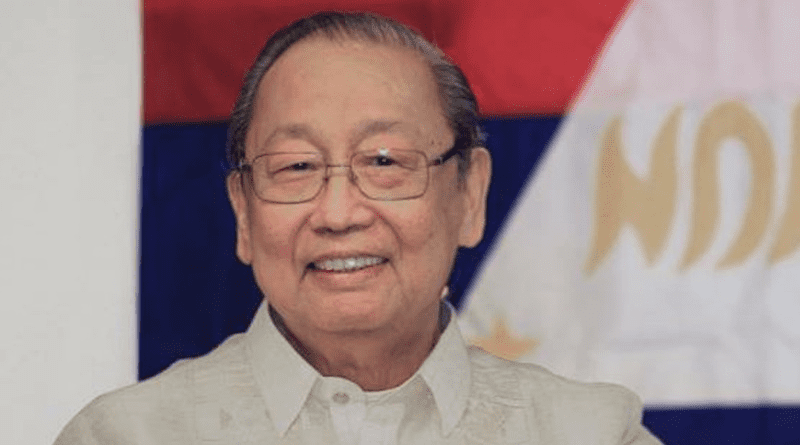Philippine Communist Party Chief Jose Maria Sison Dies In Exile At 83
By BenarNews
By Jeoffrey Maitem and Jojo Rinoza
Jose Maria Sison, the self-exiled leader of the long-running communist insurgency in the Philippines, died Friday night in the Netherlands. He was 83.
Sison had founded the Communist Party of the Philippines (CPP), which has been waging a Maoist rebellion against Manila since 1969, one of the longest-running insurgencies in the world. The fighting has killed thousands of Filipinos, and efforts at peace talks have failed repeatedly.
The CPP said Sison died at 8:30 p.m. Friday after two weeks of confinement in a hospital. It was not clear what he died of, but Sison had been frail weeks prior to being admitted.
“The greatest Filipino of the past century bereaved us peacefully last night,” Marco Valbuena, Communist Party of the Philippines chief information officer, said in a statement Saturday.
“The Filipino proletariat and toiling people grieve the death of their teacher and guiding light.”
Manila ended peace talks with the outlawed CPP in 2017 after accusing the rebels of carrying out deadly attacks despite the negotiations.
However, earlier this year, Sison said they were open for the resumption of peace talks under the then-President Ferdinand Marcos Jr. administration.
“The National Democratic Front of the Philippines is always open to peace negotiations with the government whoever is president,” Sison said, referring to the political wing of the CPP.
“It was Duterte who terminated the peace negotiations in 2017… but if the incoming Marcos administration is willing to talk, why not?” he added.
Ferdinand Marcos. Jr. won the May 9 presidential election and took the oath of office as president a month later.
The defense department said Sison’s death was “a symbol of the crumbling hierarchy.”
“His death deprived the Filipino people of the opportunity to bring this fugitive to justice under our country’s laws,” the department said in a statement,
“Sison was responsible for the deaths of thousands of our countrymen. Innocent civilians, soldiers, police, child and youth combatants died because of his bidding.”
The Defense Department called on the remaining guerrillas to surrender and “turn their backs on the violent and false ideology” of the CPP.
“Five decades of brutal and bloody aggression against the state and the Filipino people have led to nothing but destruction and strife for thousands of Filipinos,” it said.
“The greatest stumbling block of peace for the Philippines is gone; let us now give peace a chance.”
The New People’s Army, the CPP’s military wing, has about 5,000 fighters nationwide, down from at least 20,000 at its peak in the 1980s.
‘End the country’s decades-long insurgency’
Sison was born on Feb. 8, 1939 in Cabugao, Ilocos Sur. A former political science professor, he founded the CPP on Dec. 26, 1968. He went into exile in Utrecht, Netherlands, after then-President Corazon Aquino released him from custody in 1986.
The United States in 2002 classified him as a person supporting terrorism.
In 1989, the NPA killed U.S. Col. James Rowe, a military adviser to the Philippine armed forces based in the U.S. Embassy in Manila.
Rowe was ambushed by at least two NPA “sparrow” gunmen in suburban Quezon City in northern Manila and was instantly killed. His driver was wounded but survived the attack.
Rowe, a U.S. Army veteran who had spent five years as a prisoner of war in Vietnam before he escaped, was the highest ranking U.S. official to be assassinated in the Philippines.
Still, in September 2009, the European Union ruled to delist Sison as a “person supporting terrorism” and reversed a decision by member governments to freeze his assets.
Earlier this month, the Philippine Congress allocated 10 billion pesos (U.S. $180 million) to the anti-communist task force’s operating budget, down from the 17.1 billion pesos ($305 million) allotted in the 2022 spending plan to the so-called National Task Force to End Local Communist Armed Conflict (NTF-ELCAC).
The 4-year-old agency oversees government efforts to take on the CPP and its military wing, the New People’s Army.
Rep. Zaldy Co, chairman of the House Appropriations Panel, said this month that Congress recognized the need for the task force to continue with its work and “help end the country’s decades-long insurgency.”
“That’s the decision of the House, to restore the funds, because it’s difficult if the youth are recruited to take the wrong path,” he said.
“We want them to secure the future of our children.”

